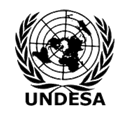In a briefing organized by the UN Department of Economic and Social Affairs (DESA), the co-chairs of the Intergovernmental Committee of Experts on Sustainable Development Financing (ICESDF) summarized and reflected on its final recommendations, which were reached in August 2014.
The ICESDF Report is currently before the UN General Assembly (UNGA) as A/69/315.
 17 October 2014: In a briefing organized by the UN Department of Economic and Social Affairs (DESA), the co-chairs of the Intergovernmental Committee of Experts on Sustainable Development Financing (ICESDF) summarized and reflected on its final recommendations, which were reached in August 2014. The ICESDF Report is currently before the UN General Assembly (UNGA) as A/69/315.
17 October 2014: In a briefing organized by the UN Department of Economic and Social Affairs (DESA), the co-chairs of the Intergovernmental Committee of Experts on Sustainable Development Financing (ICESDF) summarized and reflected on its final recommendations, which were reached in August 2014. The ICESDF Report is currently before the UN General Assembly (UNGA) as A/69/315.
In the briefing on 17 October 2014, in New York, US, Alexander Trepelkov, DESA, said the report had been presented during the annual meetings of the World Bank and the International Monetary Fund (IMF). Thomas Gass, DESA, said the report will be “one solid basis” for the upcoming intergovernmental negotiations on the post-2015 development agenda.
Mansur Muhtar, ICESDF Co-Chair, said the post-2015 development agenda must be rooted in a sizable pool of resources, and driven by a qualitative shift in those resources’ use. He stressed the need to agree on common principles for mobilizing these resources and of creating different platforms both at the country and multilateral levels to facilitate the blended financing flows. He further highlighted the importance of: a fair and equitable trade system; a stable financial international environment; sovereign debt restructuring; curbing illicit flows; tax cooperation; harmonization and integration of different streams of finance; financing for global goods; and monitoring, transparency and accountability.
Pertti Majanen, ICESDF Co-Chair, stressed that post-2015 plans will need to be implemented at the national level, citing the need for: real ownership of countries; consideration of countries’ varying abilities to mobilize financing; mainstreaming sustainable development in the national fiscal and financial policies; and creating bankable projects. He added that the global partnership, which will be an important mechanism for implementation, is just a skeleton at the moment, and called for giving it flesh and blood.
George Talbot, Co-Facilitator for the third International Conference on Financing for Development (FfD), reminded participants that FfD is not only about resources but also about policies, institutions and systems, and therefore the synergy between actors is as important as the synergy between resources. While the ICESDF report will be an important input for the Conference, he said, Member States will determine how the report is taken forward.
The preparatory process for the third International Conference on FfD started on 17 October 2014. Intergovernmental negotiations on the post-2015 development agenda are expected to begin in January 2015. [IISD RS Sources] [ICESDF Website] [Second Committee Documents]